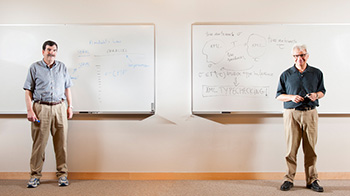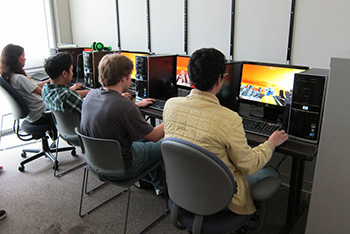
Computer Science at UC San Diego Jumps in Global Rankings: Reading Between the Ranks
By:
- Doug Ramsey
Published Date
By:
- Doug Ramsey
Share This:
Article Content
The computer science program at the University of California, San Diego is on a roll. It jumped several notches in a widely-reported international ranking of top universities by discipline, and the increase occurred prior to changes now under way in the wake of the largest gift ever in the history of the Computer Science and Engineering (CSE) department.

From left, Dean Tullsen and Victor Vianu.
According to the computer science Academic Ranking of World Universities (ARWU) in released last week, UC San Diego reached #11 in 2013. That is a substantial jump compared to rankings of #14 in 2012, and #16 in 2011. The ARWU list is produced by a research unit based at Shanghai Jiao Tong University.
“We are proud of what the latest rankings say about the computer science program, especially given the age of our campus compared to the top 10 schools,” said CSE Chair Rajesh Gupta, who also holds the Qualcomm Endowed Chair in Embedded Microsystems. “UC San Diego is barely 50 years old, and we have only had a standalone computer science and engineering department since 1987. We are at an important juncture, and we have set our sights on becoming a Top Ten department across all of our rankings.”
CSE’s ranking is likely to increase further, thanks to the $18.5 million gift from an anonymous alumnus to the department, announced in June as a part of a $25 million fundraising campaign. It is the largest-ever gift from an alum to UC San Diego, and it will allow the CSE department to improve undergraduate education and to fund five new endowed chairs for faculty, among other objectives. Given that scientific publications and highly-cited researchers represent the bulk of the indicators used for the ARWU rankings, new faculty endowed chairs are likely to boost the number and quality of computer science publications in targeted growth areas such as big data, computer systems and cyber-physical systems.
In another barometer of success in delivering computer science education, AffordableCollegesOnline.org today released its report on the top 20 programs in the United States for “lifetime” return on investment (ROI). The rankings compare the cost of a four-year undergraduate degree with the expected income in the 30 years following graduation. UC San Diego was ranked #13, with a cost of $115,500 yielding a 30-year ROI topping $1.9 million. Six UC campuses made the top 20 for ROI, led by UC Berkeley at #1.
The information was calculated based on college cost data from IPEDS, the primary federal source of data on universities, and on the 30-year net ROI, derived from Payscale.com, a leading provider of career-related earnings data.

In their final year as undergraduates, students in CSE 125 test the 3D, multiplayer networked videogames they created from scratch in the quarter before graduation.
The computer science-only ranking rose rapidly despite the methodology behind the rating system. A total of 25 percent of each university’s score is based on whether the program boasts any alumni or current faculty who have received the highest award in computer science.
Nevertheless, UC San Diego pulled even with the University of Toronto in the 2013 ranking, putting both at #11, and it overtook both Caltech (now #13) and the Weizmann Institute of Science in Israel (#23).
UC San Diego appears to have benefited from the relative strength of its track record in computer science papers, citations and quality of publications, which together account for the other 75 percent of data on which the ARWU subject rankings are based. The relative weights in each category: 25 percent of the university’s score comes from highly-cited (HiCi) researchers in computer science; 25 percent on the number of papers in all computer science-related publications and conferences; and since 2009, ARWU also looks at the percentage of those papers published in the top fifth of computer science journals (a measure of the quality of papers).
The latter category appears to account for the bulk of UC San Diego’s improvement in 2013. Its score in this category – nearly 86 percent of the top-performing school – was higher than all but five of the overall top-10 schools in this category in 2013. Similarly, only three of the top-10 did better than UC San Diego in the “highly-cited” category (led by Stanford, which ranked #1 in both HiCi scores, as well as its overall computer-science ranking).
In the Publications category, UC San Diego did better than five of the top-10 programs. The top-performing school for the number of papers indexed in the Science Citation Index-Expanded in Computer Science: China’s Tsinghua University, with a score of 100, even though, in its overall ARWU ranking, it ranked only #37.
In other ranking news, for the fourth consecutive year, Washington Monthly today ranked UC San Diego the top university in the nation. The magazine bases its “College Rankings” on how the universities act on behalf of the public interest. The rankings are based on measures of social mobility, research, and civic engagement. In a separate survey, published in July, UC San Diego was rated the #3 public university in the nation by the Center for World University Rankings, which also ranked it #20 in the world (overall, not specifically in computer science).
Share This:
You May Also Like
Stay in the Know
Keep up with all the latest from UC San Diego. Subscribe to the newsletter today.


